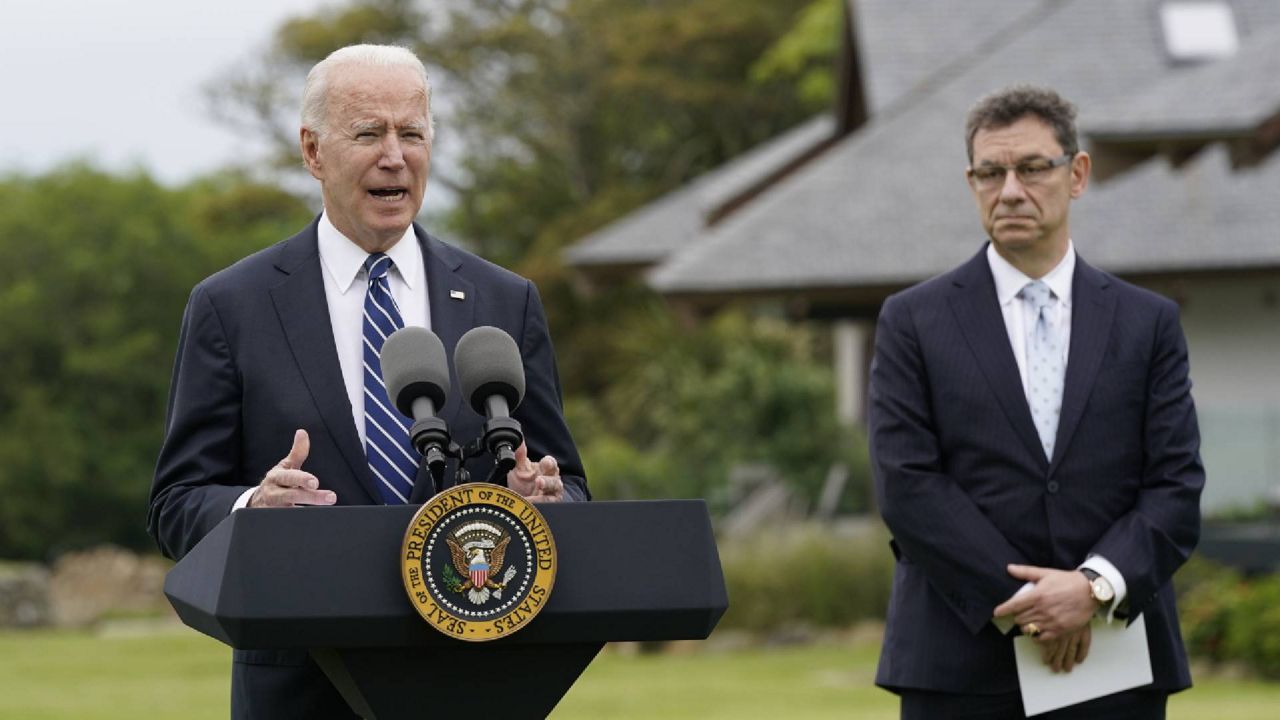President Joe Biden formally announced Thursday a U.S. plan to purchase 500 million doses of Pfizer's COVID-19 vaccine – enough to vaccinate 250 million people – and donate them to dozens of lower income countries, urging other Group of Seven leaders to do the same.
The president spoke from a Cornwall seaside town in the United Kingdom, a few hours after meeting with British Prime Minister Boris Johnson.
President Biden Thursday called the donation a historic demonstration of American values, noting it was the largest purchase and contribution of COVID-19 vaccines by any country so far.
“From the beginning of my presidency, we've been clear eyed: That we need to attack this virus globally as well,” he said. “This is about our responsibility, our humanitarian obligation to save as many lives as we can.”
Biden’s administration had previously been criticized for not committing to share more vaccines, amid a U.S. surplus and steep worldwide need.
“The United States is providing these half a billion doses with no strings attached,” the president added.
The vaccines will begin shipping in August, according to the White House, with 200 million set to be delivered by the end of 2021. The rest will be delivered by June 2022.
Doses will go to COVAX, the global vaccine sharing effort, and be distributed to 92 low and lower-middle income countries, plus the African Union. The 500 million will add to the 80 million doses Biden previously pledged to COVAX, along with a $4 billion contribution to the program.
The president was joined Thursday by Pfizer CEO Albert Bourla. The company, along with its partner BioNTech, had previously pledged to provide two billion doses to low- and middle-income countries over the next year and a half.
“Thanks to the ingenuity of so many scientists and the dedication of so many manufacturing workers, today we see clearly the light at the end of the tunnel,” Bourla said. “But we still have work to do.
The 500 million doses will be sold to the U.S. at a “not-for-profit” price — less than the $19.50 each dose usually costs — Sharon Castillo, a Pfizer spokesperson, told Spectrum News Thursday.
She also said that the 200 million doses to be donated in 2021 were already accounted for as part of Pfizer’s commitment to manufacture at maximum capacity this year.
“We are producing as many doses as humanly possible with a projected three billion doses to be manufactured in 2021,” Castillo said.
President Biden on Thursday also called on U.S. allies and G7 countries to help vaccinate the world by making similar commitments.
“I'm looking forward to working with my counterparts on these efforts in the coming days,” he said. “This is not the end of our efforts to fight COVID-19 and vaccinate the world.”
The news comes as the United States has seen about 64% of its adult population receive at least one dose of the COVID-19 vaccine, with over half of that group fully vaccinated, ahead of President Joe Biden's goal of 70% of adults with at least one shot by July 4.
Rates of COVID cases and deaths have also hit pandemic lows, and the U.S. economy is showing signs of recovery after the devastating impact from the pandemic.
But global health experts warned that purchasing doses for the world is just the first step, and administering them in communities could be a challenge.
“I think there's tremendous lessons from what we just learned in the United States, as all countries will initially face that same scarcity,” said Dr. Rebecca Weintraub, assistant professor in the Department of Global Health and Social Medicine at Harvard Medical School.
The populations facing the most barriers to vaccine access are likely also the most vulnerable to COVID-19 itself, noted Dr. John Brownstein, an epidemiologist and Chief Innovation Officer at Boston Children's Hospital.
“If those doses aren't delivered in equitable ways, then we will not necessarily be successful in bringing this pandemic to a close in any rapid sense,” he said.
Dr. Weintraub said the first step will be to vaccinate the approximately 50 million medical workers across the globe, an effort that will be overseen by COVAX.
“Workers can then stabilize access and care for the general population,” she said.
On Thursday, U.S. health officials extended the approved shelf life for the Johnson & Johnson vaccine for another six weeks, pushing its expiration date into August instead of late June.
There were millions of J&J doses on shelves across the U.S. at risk of expiring as the vaccination rate slowed across the country, the Wall Street Journal reported this week.
The White House has considered collecting those unused doses from states and donating them abroad before they expire later this summer.
And that could become the most efficient solution as confidence in the Johnson & Johnson shot inside the United States remains low due to an April pause on its use.
“Unfortunately, it has not fully recovered,” Dr. Brownstein said. “Especially as you think about hard-to-reach populations where there's potential loss of being able to get their second dose."
“There is a struggle now where we have a supply, we have an effective vaccine, but potentially not a huge amount of confidence in this particular shot,” he added.



